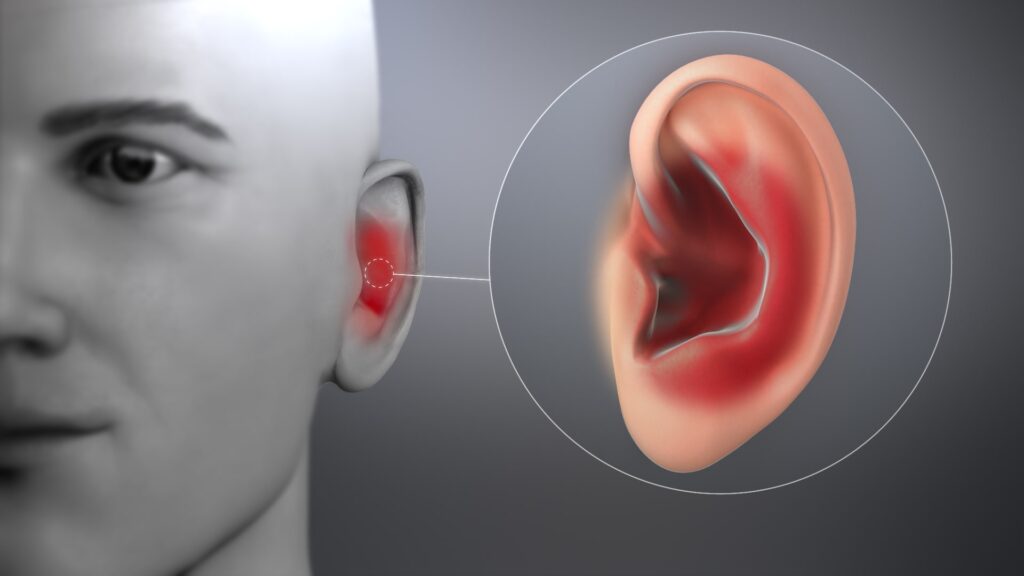WHAT IS AN EARACHE?
Earaches generally occur in children, but they can occur in adults as well. An earache might affect one or both ears, but most of the time it is in one ear. It might be constant or come and go, and the pain may be dull, sharp, or burning.
If you have an ear infection, fever and temporary hearing loss might occur. Young children with ear infections tend to be picky and irritable. They can also tug or rub their ears.
Continue to read about more symptoms, causes, treatments, and more.
EARACHE SYMPTOMS
Earaches could develop from ear infections or injury. Symptoms in adults include :
- Ear pain
- Impaired hearing
- Fluid drainage from the ear
Children could typically show additional symptoms, such as :
- Ear pain
- Muffled hearing or difficulty responding to sounds
- Fever
- Sense of fullness in the ear
- Difficulty sleeping
- Tugging or pulling at the ear
- Crying or acting irritable more than usual
- Headache
- Loss of appetite
- Loss of balance
WHAT ARE THE COMMON CAUSES OF EARACHES?
Injury, infection, irritation in the ear, or referred pain might cause earaches. Referred pain is pain felt somewhere other than the infection or injured area. For example, pain that originates in the jaw or teeth might be felt in the ear. Causes of earaches could include :
Ear infections
Ear infections are a frequent cause of earaches or ear pain. Ear infections could occur in the outer, middle, and inner ear.
An outer ear infection could be caused by swimming, wearing hearing aids or headphones that damage the skin inside the ear canal, or putting cotton swabs or fingers in the ear canal.
Skin in the ear canal that gets scratched or irritated could lead to infection. Water softens the skin in the ear canal, which could create a breeding ground for bacteria.
A middle ear infection could be caused by infections that stem from a respiratory tract infection. Fluid build-up behind the eardrums caused by these infections could breed bacteria.
Labyrinthitis is an inner ear disorder sometimes caused by viral or bacterial infections from respiratory diseases.
Other common causes of earaches
- Change in pressure, like when flying on a plane
- Earwax build-up
- A foreign object in the ear
- Strep throat
- Sinus infection
- Shampoo or water trapped in the ear
- Use of cotton swabs in the ear
Less Common Causes of Earaches
- Temporomandibular joint (TMJ) syndrome
- Perforated eardrum
- Arthritis affecting the jaw
- Infected tooth
- Impacted tooth
- Eczema in the ear canal
- Trigeminal neuralgia (chronic facial nerve pain)
MEDICAL TREATMENT FOR EARACHES
If you have an ear infection, your doctor may prescribe oral antibiotics or eardrops. In some instances, they will prescribe both.
Do not stop taking the medication once your symptoms get better. It is crucial that you finish your entire prescription to make sure that the infection will clear up completely.
If a build-up of wax is causing your ear pain, you might be given wax-softening eardrops. They can cause the wax to fall out on its own. Your doctor might also flush out the wax using a process known as ear lavage, or they may use a suction device to remove the wax.
Your doctor will treat TMJ, sinus infections, and other causes of earaches directly in order to improve your ear pain.
WHEN SHOULD YOU SEE A DOCTOR?
If you or your child has a persistent fever of 104ºF (40 ºC) or greater, seek medical attention. For an infant, seek medical help immediately for a fever greater than 101ºF (38ºC).
You should also seek immediate medical attention if you have severe pain that stops unexpectedly. This can be a sign of the eardrum rupturing.
You must also watch for other symptoms. If any of the following symptoms appear, schedule an appointment with your doctor :
- Severe ear pain
- Dizziness
- Bad headache
- Swelling around the ear
- Drooping of the facial muscles
- Blood or pus draining from the ear
You should also make an appointment with your doctor if an earache gets worse or does not improve in 24 to 48 hours.
PREVENTING EARACHES
Some earaches might be preventable. Try these preventive measures :
- Stay away from smoking and exposure to secondhand smoke.
- Keep foreign objects out of the ear.
- Dry the ears after swimming or bathing.
Avoid allergy triggers, like dust and pollen.
If you or anyone you know is suffering from earache, our expert providers at Specialty Care Clinics will take care of your health and help you recover.
Call 469-545-9983 to book a telehealth appointment for an at-home check-up.




